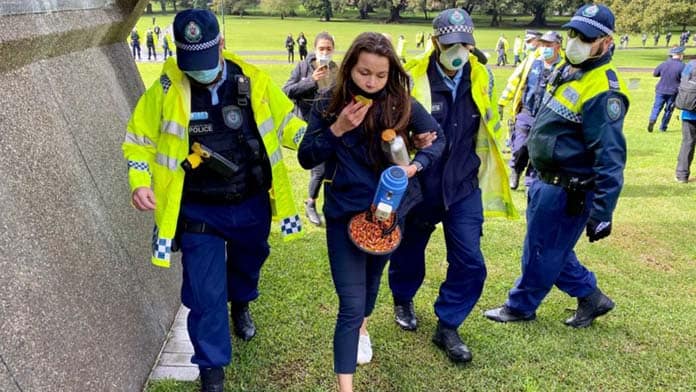There has been a concerted attack on the right to protest under the cover of the coronavirus. The Liberals and the Murdoch media have set out to scapegoat protests as somehow responsible for the virus’s spread.
Hundreds of police have been mobilised to shut down demonstrations and fine organisers.
In Sydney, a Black Lives Matter protest on 28 July demanding justice for David Dungay Jnr was dispersed by police and five people fined $1000 each.
The following week a small rally of 30 students at Sydney Uni was also broken up, with another two activists arrested and fined. Then on 28 August another ten students and staff were fined $1000 each on the campus, as police dispersed another protest on the national day of action against fee increases and cuts to universities.
Even more ridiculous were Justice Jean Dalton’s comments in the course of refusing to authorise the refugee protest at Kangaroo Point in Queensland’s Supreme Court on 15 August.
The protest, she declared, was, “by its nature I think, more than likely to spread COVID-19.”
This was after Queensland had gone nine days without a single case of community transmission, with just seven cases over the previous three weeks.
Unions have also been targeted. After a violent attack on two CFMEU officials at a building site in Melbourne on 30 June, the union held a small protest outside the site. Police arrived and fined the organiser $1652.
In Sydney police also turned up at Port Botany, where union members were meeting with MUA Sydney Branch Secretary Paul McAleer outside the terminal, warning that they were in breach of COVID-19 restrictions.
The targeting of protest is not based on genuine health concerns. Outdoor protests in NSW are currently limited to a maximum of just 20 people under health regulations, at the same time as 10,000 at a time are allowed into football stadiums, 500 at community sporting events, and thousands can gather in shopping centres and workplaces.
Premier Daniel Andrews has said, in Victoria, 80 per cent of COVID-19 cases have spread via workplaces. In NSW, there have been clusters at pubs, restaurants and churches.
Yet there has not been a single case anywhere in Australia of the virus spreading at protests.
There is a good reason for this: outdoor activities, where the wind disperses virus droplets, are far safer than indoor venues or workplaces.
And the vast majority of those at protests have worn masks and observed social distancing, in line with COVID Safe plans drawn up by organisers.
All this has not stopped a hysterical and dishonest media campaign.
The Murdoch press, spearheaded by The Australian, has tried to beat up the idea of “a link” between Melbourne’s 50,000-strong Black Lives Matter rally on 6 June and the spread of the virus there.
A series of Liberal MPs repeated the lie. Scott Morrison declared further protests “completely unacceptable” and “appalling” and claimed they put, “the whole track back to economic recovery at risk”.
But the only “link” is that six people who attended Melbourne’s protest caught the virus elsewhere.
Victoria’s Health Department issued a media statement clearly saying that, “no known nor suspected episodes of transmission occurred at the protest itself.”
Not deterred, the Murdoch media even tried to link the outbreak in Melbourne’s public housing towers to the protest.
The lie was parroted by NSW Police Commissioner Mick Fuller as a reason to ban protests in Sydney. But the Victorian Health Department debunked that one too, saying that, “None of these cases [of people at the protest who later caught the virus] are known to reside at a major public housing complex.”
Essential
There is clear hypocrisy in the limits imposed on protests. What is allowed under coronavirus health restrictions is a political decision—and the priority of governments has been to allow businesses including restaurants and pubs as well as sports stadiums to operate.
Their commitment to the right to protest—supposedly a fundamental part of a democratic society—clearly ranks well below this.
Protest is not simply something that can be put on hold until the COVID-19 pandemic is over. It is essential for workers, students and the oppressed in order to stand up for their rights.
The Black Lives Matter protests in the US have forced changes within months that had seemed impossible previously.
Cities including Los Angeles, New York and Portland have all voted to defund the police and spend the money on services instead. The protests have also dramatically shifted public opinion, with 65 per cent supporting the movement.
None of this would have happened without people taking to the streets.
The pandemic has lasted six months already, and it’s likely to be at least another six months before there is a vaccine. We need to keep fighting for our right to protest, and stand up to the use of health regulations to stop them.
By James Supple






